Leadership and Management for Service Industries - Nelson College
VerifiedAdded on 2023/01/10
|12
|4075
|22
Report
AI Summary
This report delves into the realm of leadership and management within the service industry, employing Hilton Hotels and Resorts as a central case study. The introduction emphasizes the critical role of effective leadership in employee management, talent development, and customer satisfaction, particularly within the hospitality sector. Task 1 explores classical management theories, including scientific, bureaucratic, and administrative approaches, and their application within Hilton. It further examines leadership styles such as autocratic, democratic, and coaching, along with specific management styles like laissez-faire and consultative, analyzing their impact on employee engagement and decision-making. The report analyzes internal and external factors influencing management styles, such as employee dynamics, capital availability, technological advancements, and customer expectations. Task 2, though covered in a poster, is not detailed in the provided text. The conclusion reiterates the importance of effective leadership and management in achieving organizational goals. The report provides a comprehensive overview of leadership and management principles, their practical application within a real-world service sector context, and an evaluation of Hilton Hotels' approaches.
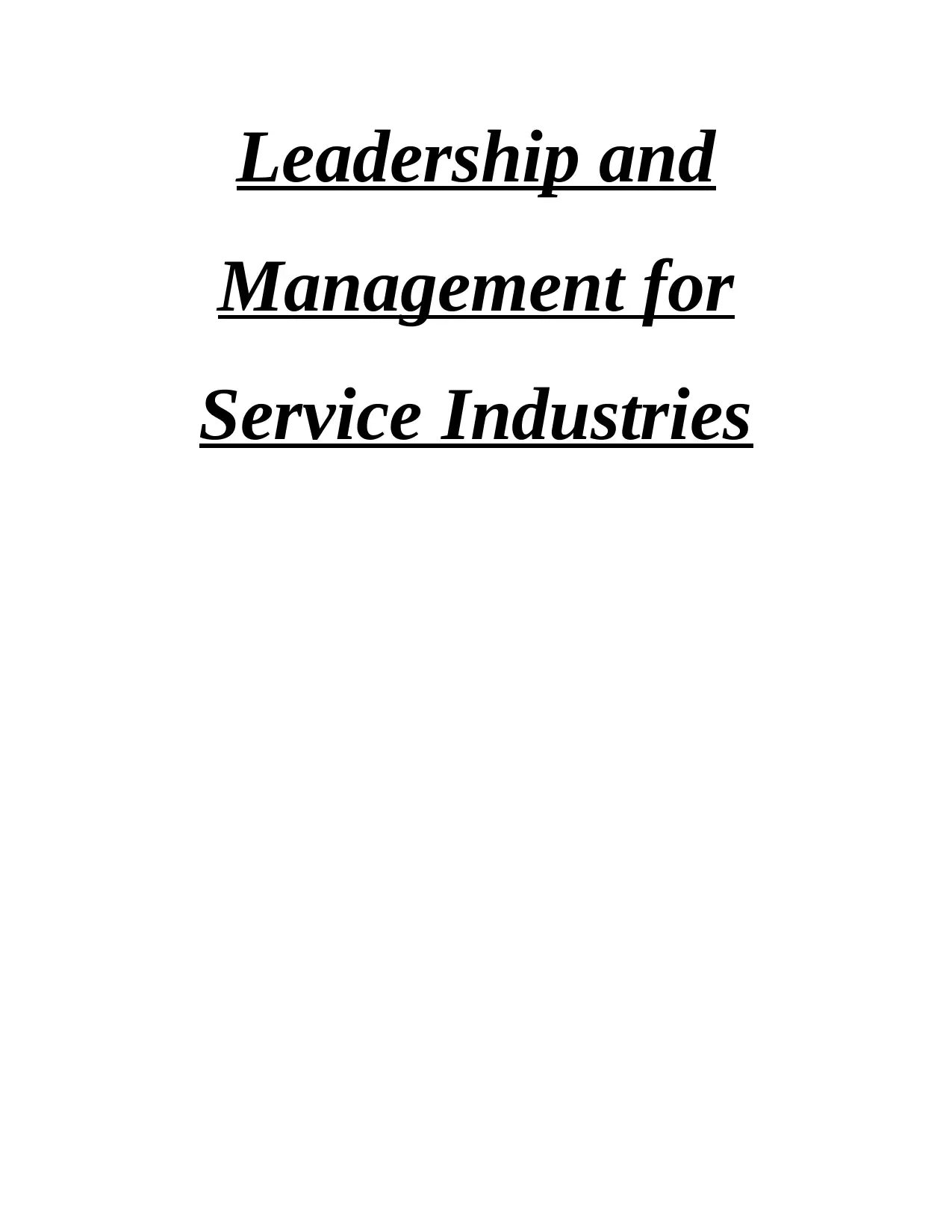
Leadership and
Management for
Service Industries
Management for
Service Industries
Paraphrase This Document
Need a fresh take? Get an instant paraphrase of this document with our AI Paraphraser
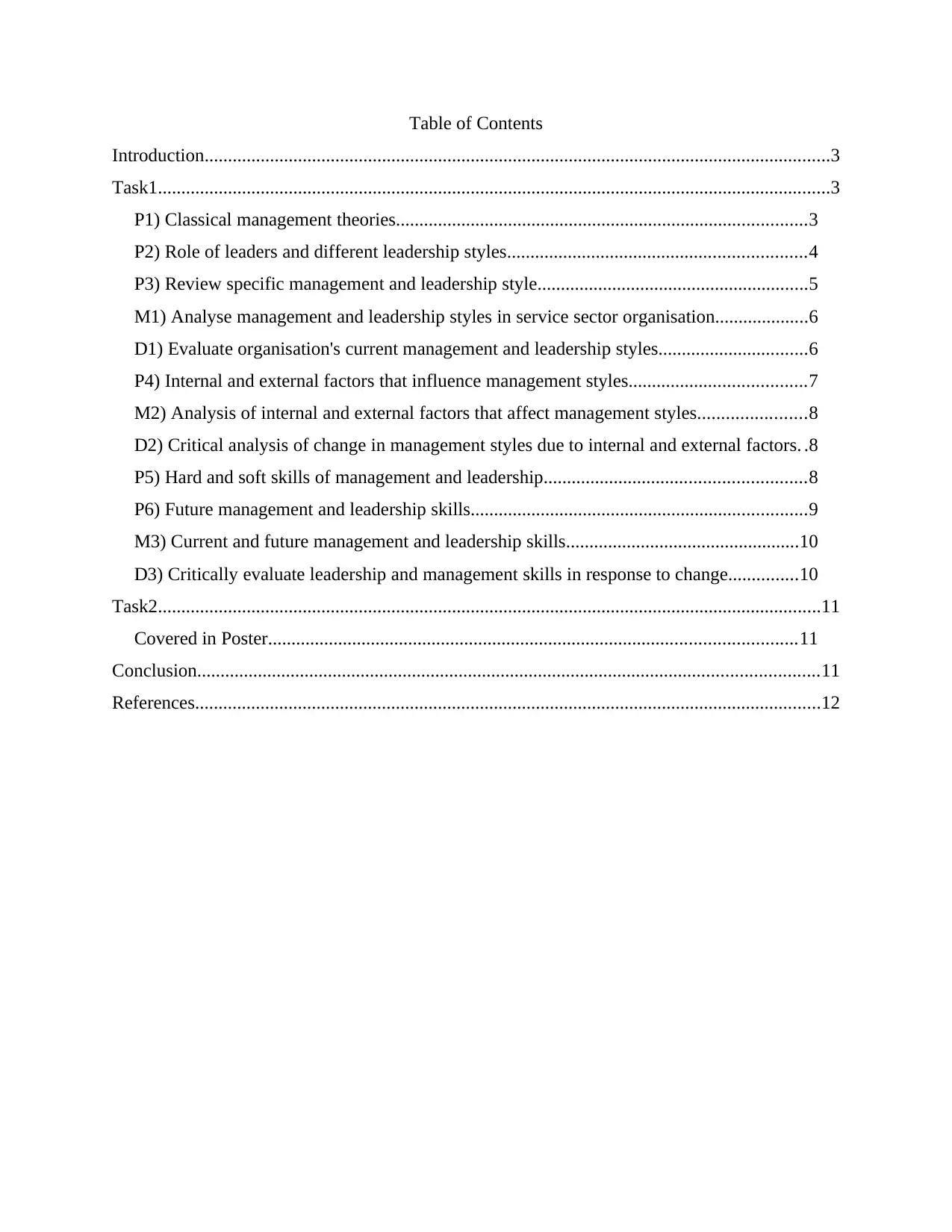
Table of Contents
Introduction......................................................................................................................................3
Task1................................................................................................................................................3
P1) Classical management theories........................................................................................3
P2) Role of leaders and different leadership styles................................................................4
P3) Review specific management and leadership style..........................................................5
M1) Analyse management and leadership styles in service sector organisation....................6
D1) Evaluate organisation's current management and leadership styles................................6
P4) Internal and external factors that influence management styles......................................7
M2) Analysis of internal and external factors that affect management styles.......................8
D2) Critical analysis of change in management styles due to internal and external factors. .8
P5) Hard and soft skills of management and leadership........................................................8
P6) Future management and leadership skills........................................................................9
M3) Current and future management and leadership skills..................................................10
D3) Critically evaluate leadership and management skills in response to change...............10
Task2..............................................................................................................................................11
Covered in Poster.................................................................................................................11
Conclusion.....................................................................................................................................11
References......................................................................................................................................12
Introduction......................................................................................................................................3
Task1................................................................................................................................................3
P1) Classical management theories........................................................................................3
P2) Role of leaders and different leadership styles................................................................4
P3) Review specific management and leadership style..........................................................5
M1) Analyse management and leadership styles in service sector organisation....................6
D1) Evaluate organisation's current management and leadership styles................................6
P4) Internal and external factors that influence management styles......................................7
M2) Analysis of internal and external factors that affect management styles.......................8
D2) Critical analysis of change in management styles due to internal and external factors. .8
P5) Hard and soft skills of management and leadership........................................................8
P6) Future management and leadership skills........................................................................9
M3) Current and future management and leadership skills..................................................10
D3) Critically evaluate leadership and management skills in response to change...............10
Task2..............................................................................................................................................11
Covered in Poster.................................................................................................................11
Conclusion.....................................................................................................................................11
References......................................................................................................................................12
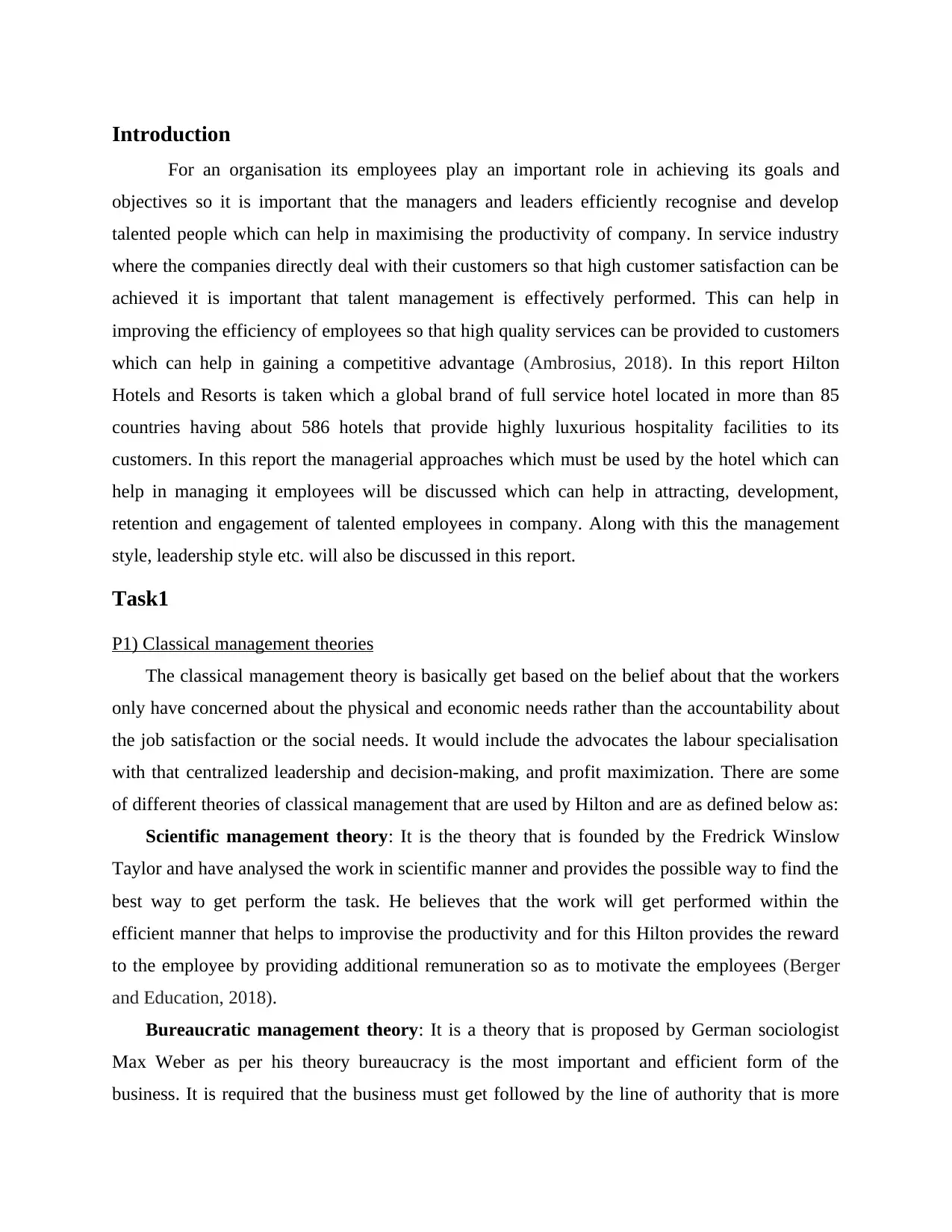
Introduction
For an organisation its employees play an important role in achieving its goals and
objectives so it is important that the managers and leaders efficiently recognise and develop
talented people which can help in maximising the productivity of company. In service industry
where the companies directly deal with their customers so that high customer satisfaction can be
achieved it is important that talent management is effectively performed. This can help in
improving the efficiency of employees so that high quality services can be provided to customers
which can help in gaining a competitive advantage (Ambrosius, 2018). In this report Hilton
Hotels and Resorts is taken which a global brand of full service hotel located in more than 85
countries having about 586 hotels that provide highly luxurious hospitality facilities to its
customers. In this report the managerial approaches which must be used by the hotel which can
help in managing it employees will be discussed which can help in attracting, development,
retention and engagement of talented employees in company. Along with this the management
style, leadership style etc. will also be discussed in this report.
Task1
P1) Classical management theories
The classical management theory is basically get based on the belief about that the workers
only have concerned about the physical and economic needs rather than the accountability about
the job satisfaction or the social needs. It would include the advocates the labour specialisation
with that centralized leadership and decision-making, and profit maximization. There are some
of different theories of classical management that are used by Hilton and are as defined below as:
Scientific management theory: It is the theory that is founded by the Fredrick Winslow
Taylor and have analysed the work in scientific manner and provides the possible way to find the
best way to get perform the task. He believes that the work will get performed within the
efficient manner that helps to improvise the productivity and for this Hilton provides the reward
to the employee by providing additional remuneration so as to motivate the employees (Berger
and Education, 2018).
Bureaucratic management theory: It is a theory that is proposed by German sociologist
Max Weber as per his theory bureaucracy is the most important and efficient form of the
business. It is required that the business must get followed by the line of authority that is more
For an organisation its employees play an important role in achieving its goals and
objectives so it is important that the managers and leaders efficiently recognise and develop
talented people which can help in maximising the productivity of company. In service industry
where the companies directly deal with their customers so that high customer satisfaction can be
achieved it is important that talent management is effectively performed. This can help in
improving the efficiency of employees so that high quality services can be provided to customers
which can help in gaining a competitive advantage (Ambrosius, 2018). In this report Hilton
Hotels and Resorts is taken which a global brand of full service hotel located in more than 85
countries having about 586 hotels that provide highly luxurious hospitality facilities to its
customers. In this report the managerial approaches which must be used by the hotel which can
help in managing it employees will be discussed which can help in attracting, development,
retention and engagement of talented employees in company. Along with this the management
style, leadership style etc. will also be discussed in this report.
Task1
P1) Classical management theories
The classical management theory is basically get based on the belief about that the workers
only have concerned about the physical and economic needs rather than the accountability about
the job satisfaction or the social needs. It would include the advocates the labour specialisation
with that centralized leadership and decision-making, and profit maximization. There are some
of different theories of classical management that are used by Hilton and are as defined below as:
Scientific management theory: It is the theory that is founded by the Fredrick Winslow
Taylor and have analysed the work in scientific manner and provides the possible way to find the
best way to get perform the task. He believes that the work will get performed within the
efficient manner that helps to improvise the productivity and for this Hilton provides the reward
to the employee by providing additional remuneration so as to motivate the employees (Berger
and Education, 2018).
Bureaucratic management theory: It is a theory that is proposed by German sociologist
Max Weber as per his theory bureaucracy is the most important and efficient form of the
business. It is required that the business must get followed by the line of authority that is more
⊘ This is a preview!⊘
Do you want full access?
Subscribe today to unlock all pages.

Trusted by 1+ million students worldwide
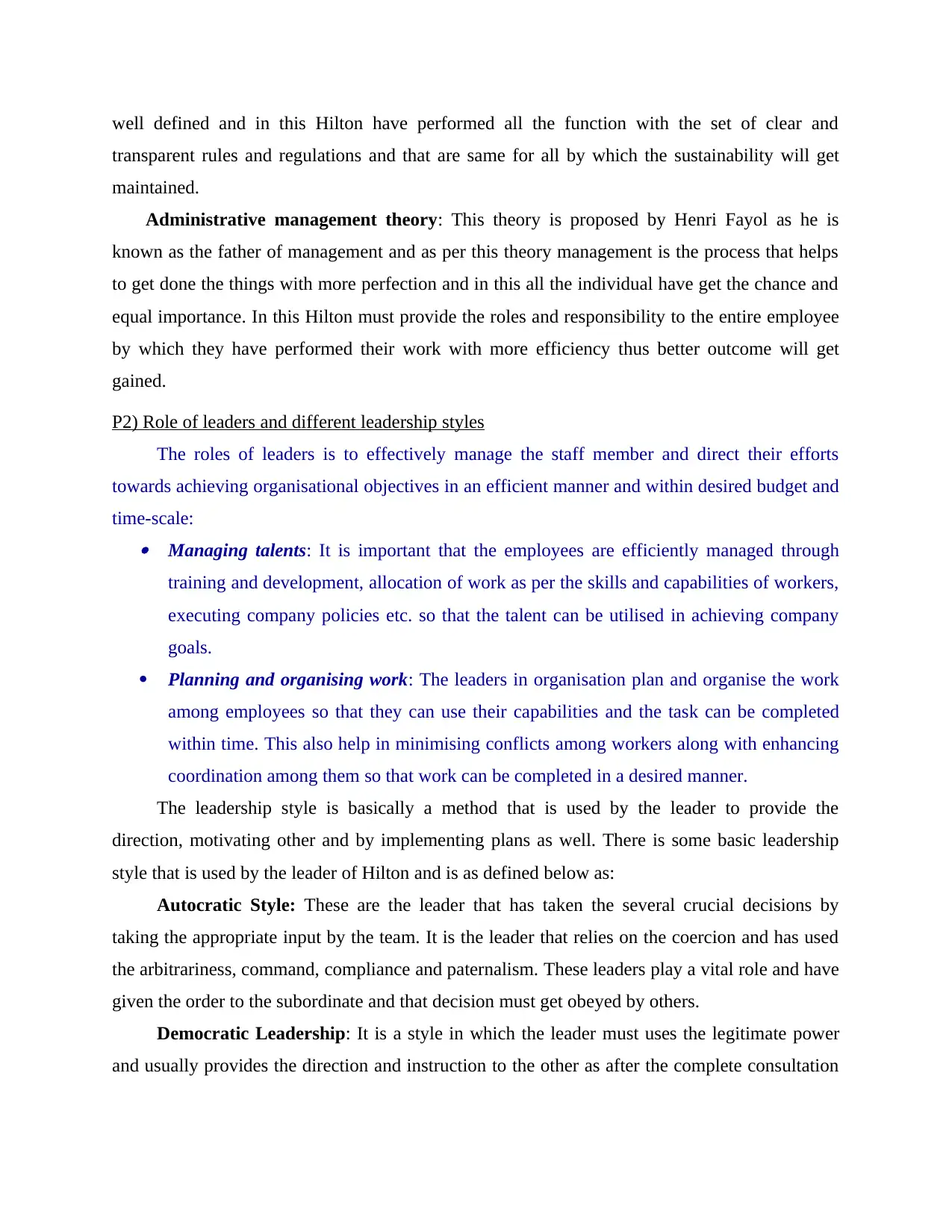
well defined and in this Hilton have performed all the function with the set of clear and
transparent rules and regulations and that are same for all by which the sustainability will get
maintained.
Administrative management theory: This theory is proposed by Henri Fayol as he is
known as the father of management and as per this theory management is the process that helps
to get done the things with more perfection and in this all the individual have get the chance and
equal importance. In this Hilton must provide the roles and responsibility to the entire employee
by which they have performed their work with more efficiency thus better outcome will get
gained.
P2) Role of leaders and different leadership styles
The roles of leaders is to effectively manage the staff member and direct their efforts
towards achieving organisational objectives in an efficient manner and within desired budget and
time-scale: Managing talents: It is important that the employees are efficiently managed through
training and development, allocation of work as per the skills and capabilities of workers,
executing company policies etc. so that the talent can be utilised in achieving company
goals.
Planning and organising work: The leaders in organisation plan and organise the work
among employees so that they can use their capabilities and the task can be completed
within time. This also help in minimising conflicts among workers along with enhancing
coordination among them so that work can be completed in a desired manner.
The leadership style is basically a method that is used by the leader to provide the
direction, motivating other and by implementing plans as well. There is some basic leadership
style that is used by the leader of Hilton and is as defined below as:
Autocratic Style: These are the leader that has taken the several crucial decisions by
taking the appropriate input by the team. It is the leader that relies on the coercion and has used
the arbitrariness, command, compliance and paternalism. These leaders play a vital role and have
given the order to the subordinate and that decision must get obeyed by others.
Democratic Leadership: It is a style in which the leader must uses the legitimate power
and usually provides the direction and instruction to the other as after the complete consultation
transparent rules and regulations and that are same for all by which the sustainability will get
maintained.
Administrative management theory: This theory is proposed by Henri Fayol as he is
known as the father of management and as per this theory management is the process that helps
to get done the things with more perfection and in this all the individual have get the chance and
equal importance. In this Hilton must provide the roles and responsibility to the entire employee
by which they have performed their work with more efficiency thus better outcome will get
gained.
P2) Role of leaders and different leadership styles
The roles of leaders is to effectively manage the staff member and direct their efforts
towards achieving organisational objectives in an efficient manner and within desired budget and
time-scale: Managing talents: It is important that the employees are efficiently managed through
training and development, allocation of work as per the skills and capabilities of workers,
executing company policies etc. so that the talent can be utilised in achieving company
goals.
Planning and organising work: The leaders in organisation plan and organise the work
among employees so that they can use their capabilities and the task can be completed
within time. This also help in minimising conflicts among workers along with enhancing
coordination among them so that work can be completed in a desired manner.
The leadership style is basically a method that is used by the leader to provide the
direction, motivating other and by implementing plans as well. There is some basic leadership
style that is used by the leader of Hilton and is as defined below as:
Autocratic Style: These are the leader that has taken the several crucial decisions by
taking the appropriate input by the team. It is the leader that relies on the coercion and has used
the arbitrariness, command, compliance and paternalism. These leaders play a vital role and have
given the order to the subordinate and that decision must get obeyed by others.
Democratic Leadership: It is a style in which the leader must uses the legitimate power
and usually provides the direction and instruction to the other as after the complete consultation
Paraphrase This Document
Need a fresh take? Get an instant paraphrase of this document with our AI Paraphraser
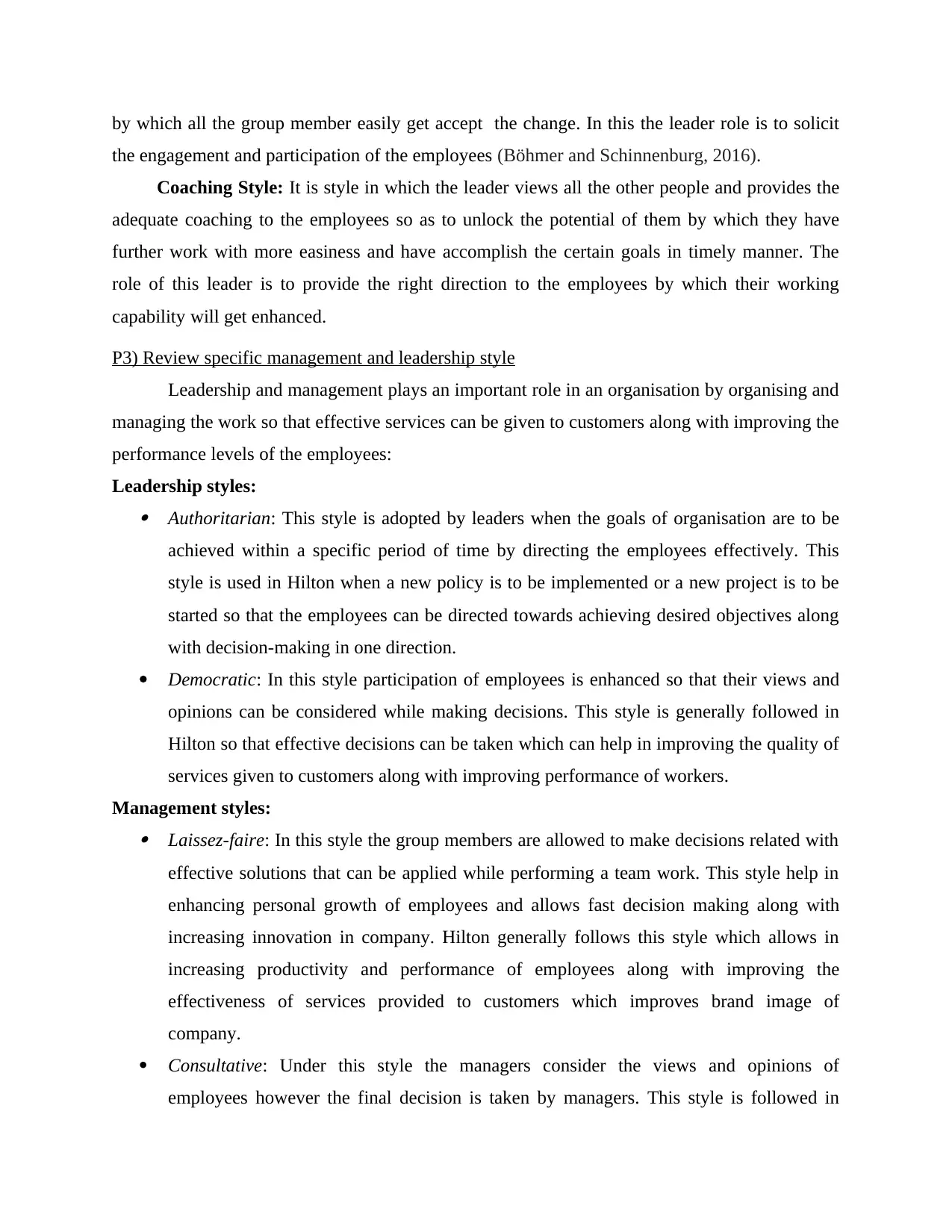
by which all the group member easily get accept the change. In this the leader role is to solicit
the engagement and participation of the employees (Böhmer and Schinnenburg, 2016).
Coaching Style: It is style in which the leader views all the other people and provides the
adequate coaching to the employees so as to unlock the potential of them by which they have
further work with more easiness and have accomplish the certain goals in timely manner. The
role of this leader is to provide the right direction to the employees by which their working
capability will get enhanced.
P3) Review specific management and leadership style
Leadership and management plays an important role in an organisation by organising and
managing the work so that effective services can be given to customers along with improving the
performance levels of the employees:
Leadership styles: Authoritarian: This style is adopted by leaders when the goals of organisation are to be
achieved within a specific period of time by directing the employees effectively. This
style is used in Hilton when a new policy is to be implemented or a new project is to be
started so that the employees can be directed towards achieving desired objectives along
with decision-making in one direction.
Democratic: In this style participation of employees is enhanced so that their views and
opinions can be considered while making decisions. This style is generally followed in
Hilton so that effective decisions can be taken which can help in improving the quality of
services given to customers along with improving performance of workers.
Management styles: Laissez-faire: In this style the group members are allowed to make decisions related with
effective solutions that can be applied while performing a team work. This style help in
enhancing personal growth of employees and allows fast decision making along with
increasing innovation in company. Hilton generally follows this style which allows in
increasing productivity and performance of employees along with improving the
effectiveness of services provided to customers which improves brand image of
company.
Consultative: Under this style the managers consider the views and opinions of
employees however the final decision is taken by managers. This style is followed in
the engagement and participation of the employees (Böhmer and Schinnenburg, 2016).
Coaching Style: It is style in which the leader views all the other people and provides the
adequate coaching to the employees so as to unlock the potential of them by which they have
further work with more easiness and have accomplish the certain goals in timely manner. The
role of this leader is to provide the right direction to the employees by which their working
capability will get enhanced.
P3) Review specific management and leadership style
Leadership and management plays an important role in an organisation by organising and
managing the work so that effective services can be given to customers along with improving the
performance levels of the employees:
Leadership styles: Authoritarian: This style is adopted by leaders when the goals of organisation are to be
achieved within a specific period of time by directing the employees effectively. This
style is used in Hilton when a new policy is to be implemented or a new project is to be
started so that the employees can be directed towards achieving desired objectives along
with decision-making in one direction.
Democratic: In this style participation of employees is enhanced so that their views and
opinions can be considered while making decisions. This style is generally followed in
Hilton so that effective decisions can be taken which can help in improving the quality of
services given to customers along with improving performance of workers.
Management styles: Laissez-faire: In this style the group members are allowed to make decisions related with
effective solutions that can be applied while performing a team work. This style help in
enhancing personal growth of employees and allows fast decision making along with
increasing innovation in company. Hilton generally follows this style which allows in
increasing productivity and performance of employees along with improving the
effectiveness of services provided to customers which improves brand image of
company.
Consultative: Under this style the managers consider the views and opinions of
employees however the final decision is taken by managers. This style is followed in
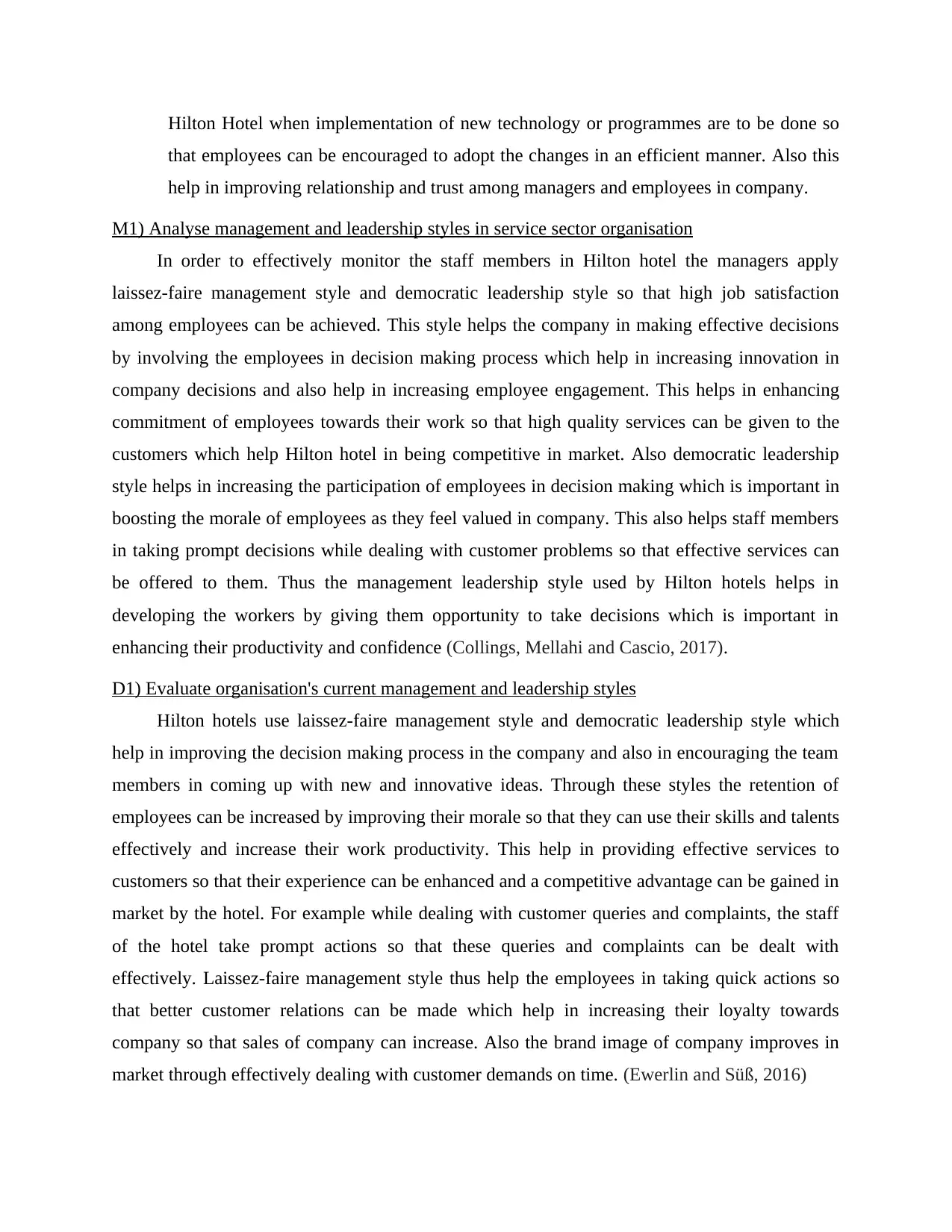
Hilton Hotel when implementation of new technology or programmes are to be done so
that employees can be encouraged to adopt the changes in an efficient manner. Also this
help in improving relationship and trust among managers and employees in company.
M1) Analyse management and leadership styles in service sector organisation
In order to effectively monitor the staff members in Hilton hotel the managers apply
laissez-faire management style and democratic leadership style so that high job satisfaction
among employees can be achieved. This style helps the company in making effective decisions
by involving the employees in decision making process which help in increasing innovation in
company decisions and also help in increasing employee engagement. This helps in enhancing
commitment of employees towards their work so that high quality services can be given to the
customers which help Hilton hotel in being competitive in market. Also democratic leadership
style helps in increasing the participation of employees in decision making which is important in
boosting the morale of employees as they feel valued in company. This also helps staff members
in taking prompt decisions while dealing with customer problems so that effective services can
be offered to them. Thus the management leadership style used by Hilton hotels helps in
developing the workers by giving them opportunity to take decisions which is important in
enhancing their productivity and confidence (Collings, Mellahi and Cascio, 2017).
D1) Evaluate organisation's current management and leadership styles
Hilton hotels use laissez-faire management style and democratic leadership style which
help in improving the decision making process in the company and also in encouraging the team
members in coming up with new and innovative ideas. Through these styles the retention of
employees can be increased by improving their morale so that they can use their skills and talents
effectively and increase their work productivity. This help in providing effective services to
customers so that their experience can be enhanced and a competitive advantage can be gained in
market by the hotel. For example while dealing with customer queries and complaints, the staff
of the hotel take prompt actions so that these queries and complaints can be dealt with
effectively. Laissez-faire management style thus help the employees in taking quick actions so
that better customer relations can be made which help in increasing their loyalty towards
company so that sales of company can increase. Also the brand image of company improves in
market through effectively dealing with customer demands on time. (Ewerlin and Süß, 2016)
that employees can be encouraged to adopt the changes in an efficient manner. Also this
help in improving relationship and trust among managers and employees in company.
M1) Analyse management and leadership styles in service sector organisation
In order to effectively monitor the staff members in Hilton hotel the managers apply
laissez-faire management style and democratic leadership style so that high job satisfaction
among employees can be achieved. This style helps the company in making effective decisions
by involving the employees in decision making process which help in increasing innovation in
company decisions and also help in increasing employee engagement. This helps in enhancing
commitment of employees towards their work so that high quality services can be given to the
customers which help Hilton hotel in being competitive in market. Also democratic leadership
style helps in increasing the participation of employees in decision making which is important in
boosting the morale of employees as they feel valued in company. This also helps staff members
in taking prompt decisions while dealing with customer problems so that effective services can
be offered to them. Thus the management leadership style used by Hilton hotels helps in
developing the workers by giving them opportunity to take decisions which is important in
enhancing their productivity and confidence (Collings, Mellahi and Cascio, 2017).
D1) Evaluate organisation's current management and leadership styles
Hilton hotels use laissez-faire management style and democratic leadership style which
help in improving the decision making process in the company and also in encouraging the team
members in coming up with new and innovative ideas. Through these styles the retention of
employees can be increased by improving their morale so that they can use their skills and talents
effectively and increase their work productivity. This help in providing effective services to
customers so that their experience can be enhanced and a competitive advantage can be gained in
market by the hotel. For example while dealing with customer queries and complaints, the staff
of the hotel take prompt actions so that these queries and complaints can be dealt with
effectively. Laissez-faire management style thus help the employees in taking quick actions so
that better customer relations can be made which help in increasing their loyalty towards
company so that sales of company can increase. Also the brand image of company improves in
market through effectively dealing with customer demands on time. (Ewerlin and Süß, 2016)
⊘ This is a preview!⊘
Do you want full access?
Subscribe today to unlock all pages.

Trusted by 1+ million students worldwide
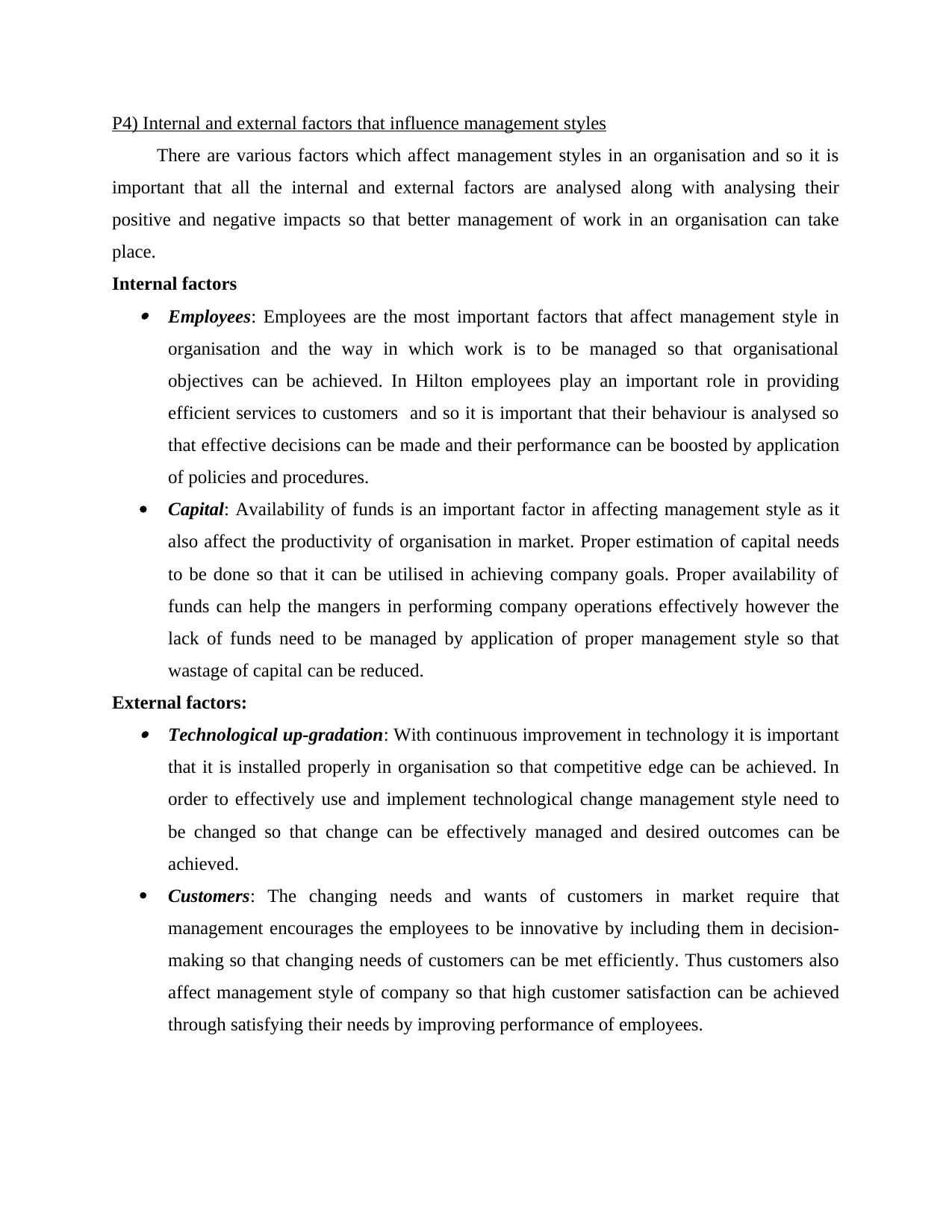
P4) Internal and external factors that influence management styles
There are various factors which affect management styles in an organisation and so it is
important that all the internal and external factors are analysed along with analysing their
positive and negative impacts so that better management of work in an organisation can take
place.
Internal factors Employees: Employees are the most important factors that affect management style in
organisation and the way in which work is to be managed so that organisational
objectives can be achieved. In Hilton employees play an important role in providing
efficient services to customers and so it is important that their behaviour is analysed so
that effective decisions can be made and their performance can be boosted by application
of policies and procedures.
Capital: Availability of funds is an important factor in affecting management style as it
also affect the productivity of organisation in market. Proper estimation of capital needs
to be done so that it can be utilised in achieving company goals. Proper availability of
funds can help the mangers in performing company operations effectively however the
lack of funds need to be managed by application of proper management style so that
wastage of capital can be reduced.
External factors: Technological up-gradation: With continuous improvement in technology it is important
that it is installed properly in organisation so that competitive edge can be achieved. In
order to effectively use and implement technological change management style need to
be changed so that change can be effectively managed and desired outcomes can be
achieved.
Customers: The changing needs and wants of customers in market require that
management encourages the employees to be innovative by including them in decision-
making so that changing needs of customers can be met efficiently. Thus customers also
affect management style of company so that high customer satisfaction can be achieved
through satisfying their needs by improving performance of employees.
There are various factors which affect management styles in an organisation and so it is
important that all the internal and external factors are analysed along with analysing their
positive and negative impacts so that better management of work in an organisation can take
place.
Internal factors Employees: Employees are the most important factors that affect management style in
organisation and the way in which work is to be managed so that organisational
objectives can be achieved. In Hilton employees play an important role in providing
efficient services to customers and so it is important that their behaviour is analysed so
that effective decisions can be made and their performance can be boosted by application
of policies and procedures.
Capital: Availability of funds is an important factor in affecting management style as it
also affect the productivity of organisation in market. Proper estimation of capital needs
to be done so that it can be utilised in achieving company goals. Proper availability of
funds can help the mangers in performing company operations effectively however the
lack of funds need to be managed by application of proper management style so that
wastage of capital can be reduced.
External factors: Technological up-gradation: With continuous improvement in technology it is important
that it is installed properly in organisation so that competitive edge can be achieved. In
order to effectively use and implement technological change management style need to
be changed so that change can be effectively managed and desired outcomes can be
achieved.
Customers: The changing needs and wants of customers in market require that
management encourages the employees to be innovative by including them in decision-
making so that changing needs of customers can be met efficiently. Thus customers also
affect management style of company so that high customer satisfaction can be achieved
through satisfying their needs by improving performance of employees.
Paraphrase This Document
Need a fresh take? Get an instant paraphrase of this document with our AI Paraphraser
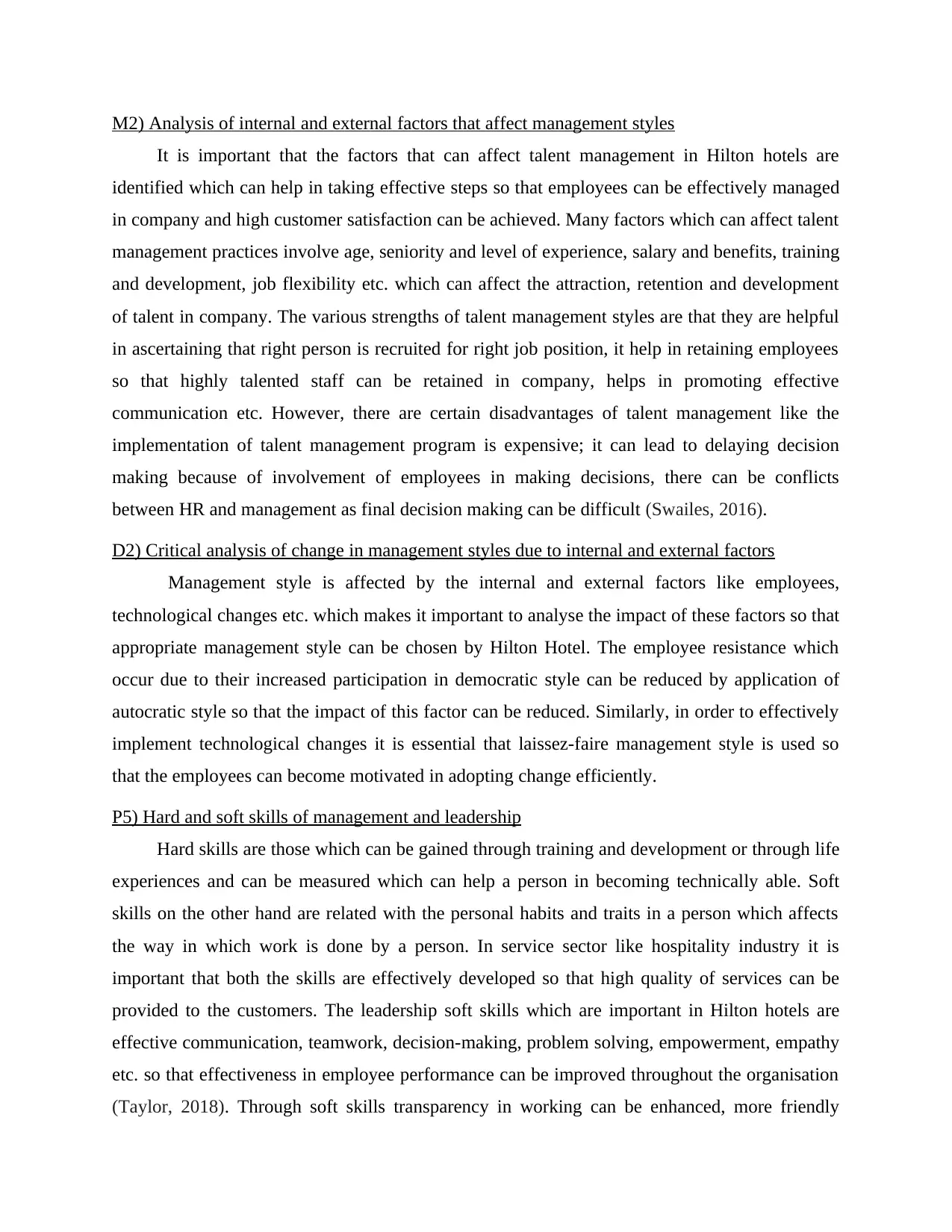
M2) Analysis of internal and external factors that affect management styles
It is important that the factors that can affect talent management in Hilton hotels are
identified which can help in taking effective steps so that employees can be effectively managed
in company and high customer satisfaction can be achieved. Many factors which can affect talent
management practices involve age, seniority and level of experience, salary and benefits, training
and development, job flexibility etc. which can affect the attraction, retention and development
of talent in company. The various strengths of talent management styles are that they are helpful
in ascertaining that right person is recruited for right job position, it help in retaining employees
so that highly talented staff can be retained in company, helps in promoting effective
communication etc. However, there are certain disadvantages of talent management like the
implementation of talent management program is expensive; it can lead to delaying decision
making because of involvement of employees in making decisions, there can be conflicts
between HR and management as final decision making can be difficult (Swailes, 2016).
D2) Critical analysis of change in management styles due to internal and external factors
Management style is affected by the internal and external factors like employees,
technological changes etc. which makes it important to analyse the impact of these factors so that
appropriate management style can be chosen by Hilton Hotel. The employee resistance which
occur due to their increased participation in democratic style can be reduced by application of
autocratic style so that the impact of this factor can be reduced. Similarly, in order to effectively
implement technological changes it is essential that laissez-faire management style is used so
that the employees can become motivated in adopting change efficiently.
P5) Hard and soft skills of management and leadership
Hard skills are those which can be gained through training and development or through life
experiences and can be measured which can help a person in becoming technically able. Soft
skills on the other hand are related with the personal habits and traits in a person which affects
the way in which work is done by a person. In service sector like hospitality industry it is
important that both the skills are effectively developed so that high quality of services can be
provided to the customers. The leadership soft skills which are important in Hilton hotels are
effective communication, teamwork, decision-making, problem solving, empowerment, empathy
etc. so that effectiveness in employee performance can be improved throughout the organisation
(Taylor, 2018). Through soft skills transparency in working can be enhanced, more friendly
It is important that the factors that can affect talent management in Hilton hotels are
identified which can help in taking effective steps so that employees can be effectively managed
in company and high customer satisfaction can be achieved. Many factors which can affect talent
management practices involve age, seniority and level of experience, salary and benefits, training
and development, job flexibility etc. which can affect the attraction, retention and development
of talent in company. The various strengths of talent management styles are that they are helpful
in ascertaining that right person is recruited for right job position, it help in retaining employees
so that highly talented staff can be retained in company, helps in promoting effective
communication etc. However, there are certain disadvantages of talent management like the
implementation of talent management program is expensive; it can lead to delaying decision
making because of involvement of employees in making decisions, there can be conflicts
between HR and management as final decision making can be difficult (Swailes, 2016).
D2) Critical analysis of change in management styles due to internal and external factors
Management style is affected by the internal and external factors like employees,
technological changes etc. which makes it important to analyse the impact of these factors so that
appropriate management style can be chosen by Hilton Hotel. The employee resistance which
occur due to their increased participation in democratic style can be reduced by application of
autocratic style so that the impact of this factor can be reduced. Similarly, in order to effectively
implement technological changes it is essential that laissez-faire management style is used so
that the employees can become motivated in adopting change efficiently.
P5) Hard and soft skills of management and leadership
Hard skills are those which can be gained through training and development or through life
experiences and can be measured which can help a person in becoming technically able. Soft
skills on the other hand are related with the personal habits and traits in a person which affects
the way in which work is done by a person. In service sector like hospitality industry it is
important that both the skills are effectively developed so that high quality of services can be
provided to the customers. The leadership soft skills which are important in Hilton hotels are
effective communication, teamwork, decision-making, problem solving, empowerment, empathy
etc. so that effectiveness in employee performance can be improved throughout the organisation
(Taylor, 2018). Through soft skills transparency in working can be enhanced, more friendly
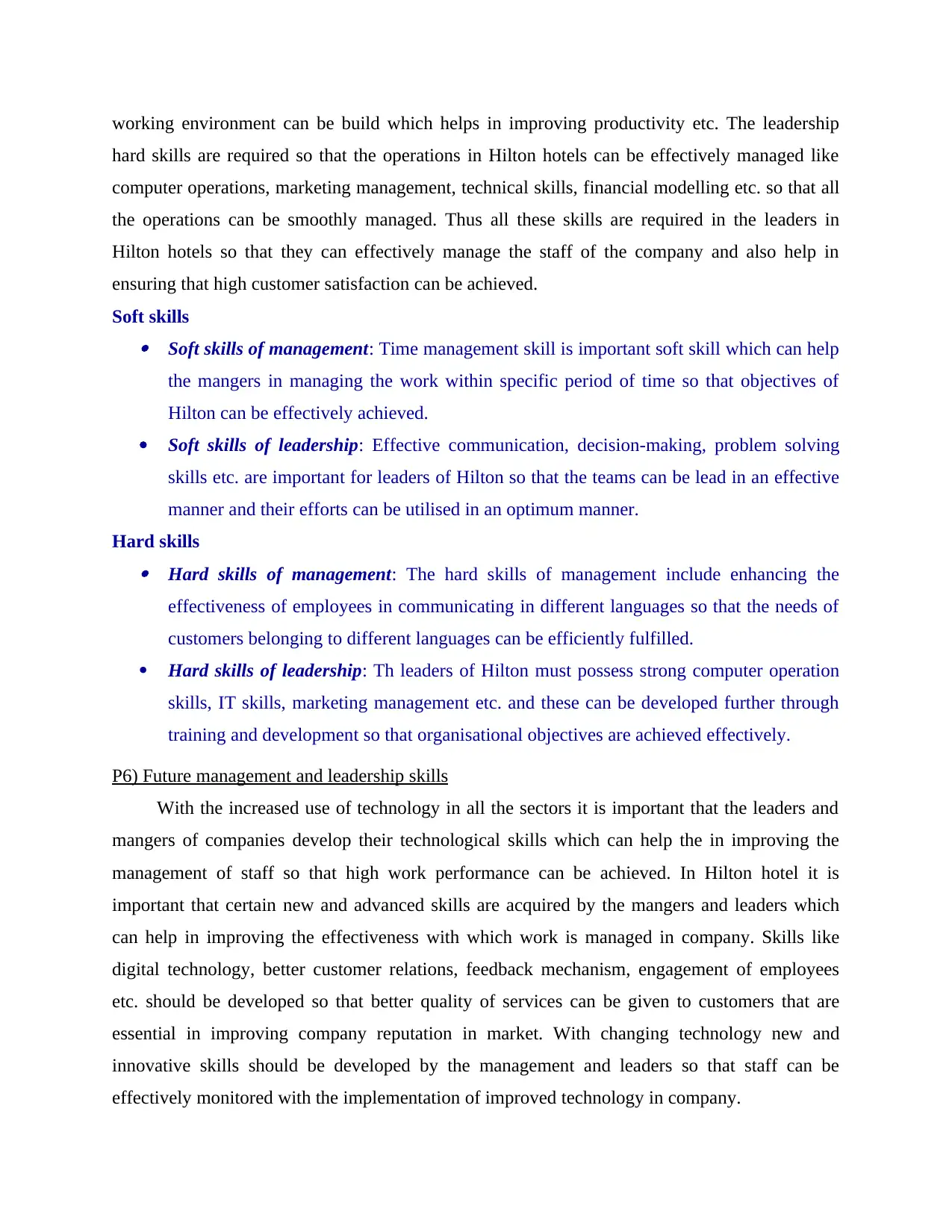
working environment can be build which helps in improving productivity etc. The leadership
hard skills are required so that the operations in Hilton hotels can be effectively managed like
computer operations, marketing management, technical skills, financial modelling etc. so that all
the operations can be smoothly managed. Thus all these skills are required in the leaders in
Hilton hotels so that they can effectively manage the staff of the company and also help in
ensuring that high customer satisfaction can be achieved.
Soft skills Soft skills of management: Time management skill is important soft skill which can help
the mangers in managing the work within specific period of time so that objectives of
Hilton can be effectively achieved.
Soft skills of leadership: Effective communication, decision-making, problem solving
skills etc. are important for leaders of Hilton so that the teams can be lead in an effective
manner and their efforts can be utilised in an optimum manner.
Hard skills Hard skills of management: The hard skills of management include enhancing the
effectiveness of employees in communicating in different languages so that the needs of
customers belonging to different languages can be efficiently fulfilled.
Hard skills of leadership: Th leaders of Hilton must possess strong computer operation
skills, IT skills, marketing management etc. and these can be developed further through
training and development so that organisational objectives are achieved effectively.
P6) Future management and leadership skills
With the increased use of technology in all the sectors it is important that the leaders and
mangers of companies develop their technological skills which can help the in improving the
management of staff so that high work performance can be achieved. In Hilton hotel it is
important that certain new and advanced skills are acquired by the mangers and leaders which
can help in improving the effectiveness with which work is managed in company. Skills like
digital technology, better customer relations, feedback mechanism, engagement of employees
etc. should be developed so that better quality of services can be given to customers that are
essential in improving company reputation in market. With changing technology new and
innovative skills should be developed by the management and leaders so that staff can be
effectively monitored with the implementation of improved technology in company.
hard skills are required so that the operations in Hilton hotels can be effectively managed like
computer operations, marketing management, technical skills, financial modelling etc. so that all
the operations can be smoothly managed. Thus all these skills are required in the leaders in
Hilton hotels so that they can effectively manage the staff of the company and also help in
ensuring that high customer satisfaction can be achieved.
Soft skills Soft skills of management: Time management skill is important soft skill which can help
the mangers in managing the work within specific period of time so that objectives of
Hilton can be effectively achieved.
Soft skills of leadership: Effective communication, decision-making, problem solving
skills etc. are important for leaders of Hilton so that the teams can be lead in an effective
manner and their efforts can be utilised in an optimum manner.
Hard skills Hard skills of management: The hard skills of management include enhancing the
effectiveness of employees in communicating in different languages so that the needs of
customers belonging to different languages can be efficiently fulfilled.
Hard skills of leadership: Th leaders of Hilton must possess strong computer operation
skills, IT skills, marketing management etc. and these can be developed further through
training and development so that organisational objectives are achieved effectively.
P6) Future management and leadership skills
With the increased use of technology in all the sectors it is important that the leaders and
mangers of companies develop their technological skills which can help the in improving the
management of staff so that high work performance can be achieved. In Hilton hotel it is
important that certain new and advanced skills are acquired by the mangers and leaders which
can help in improving the effectiveness with which work is managed in company. Skills like
digital technology, better customer relations, feedback mechanism, engagement of employees
etc. should be developed so that better quality of services can be given to customers that are
essential in improving company reputation in market. With changing technology new and
innovative skills should be developed by the management and leaders so that staff can be
effectively monitored with the implementation of improved technology in company.
⊘ This is a preview!⊘
Do you want full access?
Subscribe today to unlock all pages.

Trusted by 1+ million students worldwide
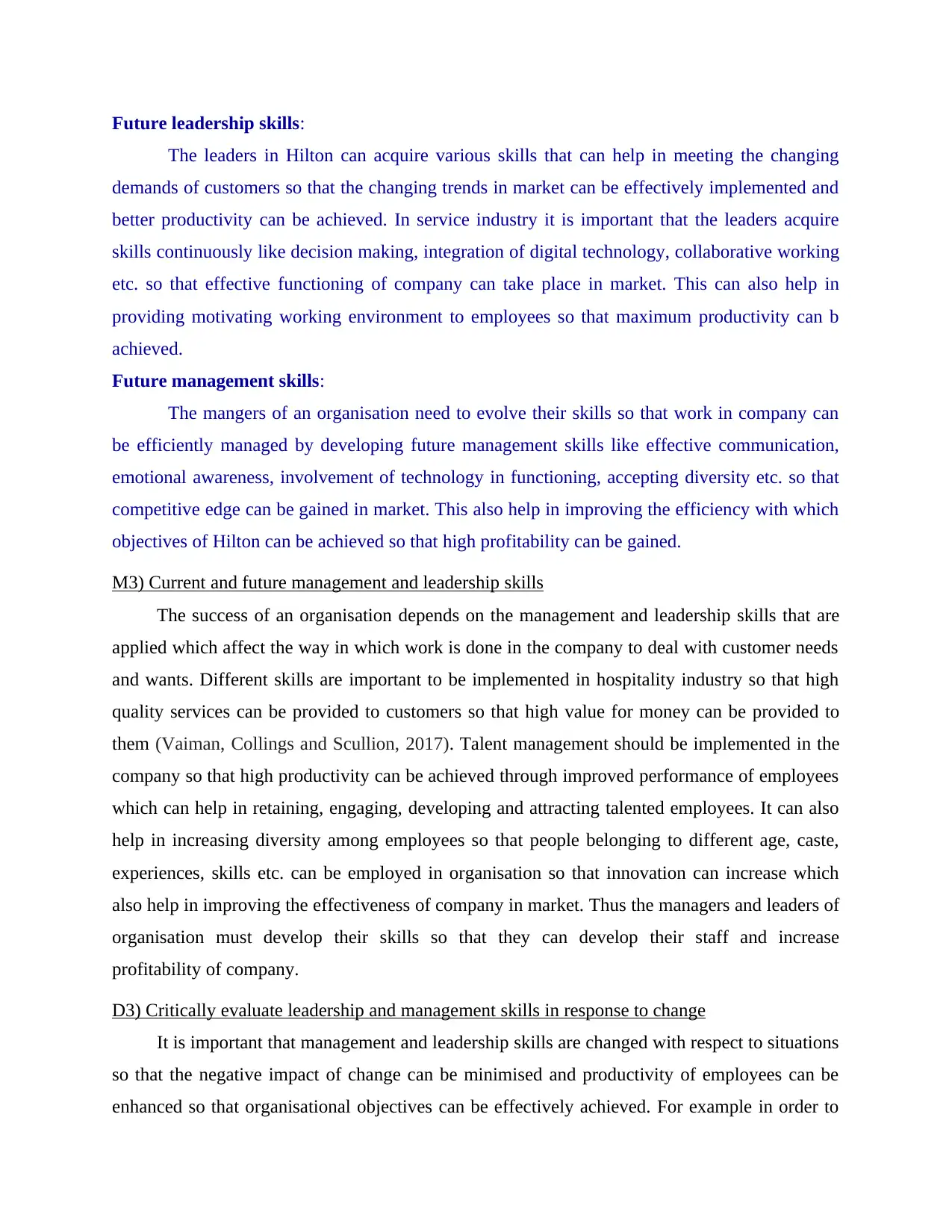
Future leadership skills:
The leaders in Hilton can acquire various skills that can help in meeting the changing
demands of customers so that the changing trends in market can be effectively implemented and
better productivity can be achieved. In service industry it is important that the leaders acquire
skills continuously like decision making, integration of digital technology, collaborative working
etc. so that effective functioning of company can take place in market. This can also help in
providing motivating working environment to employees so that maximum productivity can b
achieved.
Future management skills:
The mangers of an organisation need to evolve their skills so that work in company can
be efficiently managed by developing future management skills like effective communication,
emotional awareness, involvement of technology in functioning, accepting diversity etc. so that
competitive edge can be gained in market. This also help in improving the efficiency with which
objectives of Hilton can be achieved so that high profitability can be gained.
M3) Current and future management and leadership skills
The success of an organisation depends on the management and leadership skills that are
applied which affect the way in which work is done in the company to deal with customer needs
and wants. Different skills are important to be implemented in hospitality industry so that high
quality services can be provided to customers so that high value for money can be provided to
them (Vaiman, Collings and Scullion, 2017). Talent management should be implemented in the
company so that high productivity can be achieved through improved performance of employees
which can help in retaining, engaging, developing and attracting talented employees. It can also
help in increasing diversity among employees so that people belonging to different age, caste,
experiences, skills etc. can be employed in organisation so that innovation can increase which
also help in improving the effectiveness of company in market. Thus the managers and leaders of
organisation must develop their skills so that they can develop their staff and increase
profitability of company.
D3) Critically evaluate leadership and management skills in response to change
It is important that management and leadership skills are changed with respect to situations
so that the negative impact of change can be minimised and productivity of employees can be
enhanced so that organisational objectives can be effectively achieved. For example in order to
The leaders in Hilton can acquire various skills that can help in meeting the changing
demands of customers so that the changing trends in market can be effectively implemented and
better productivity can be achieved. In service industry it is important that the leaders acquire
skills continuously like decision making, integration of digital technology, collaborative working
etc. so that effective functioning of company can take place in market. This can also help in
providing motivating working environment to employees so that maximum productivity can b
achieved.
Future management skills:
The mangers of an organisation need to evolve their skills so that work in company can
be efficiently managed by developing future management skills like effective communication,
emotional awareness, involvement of technology in functioning, accepting diversity etc. so that
competitive edge can be gained in market. This also help in improving the efficiency with which
objectives of Hilton can be achieved so that high profitability can be gained.
M3) Current and future management and leadership skills
The success of an organisation depends on the management and leadership skills that are
applied which affect the way in which work is done in the company to deal with customer needs
and wants. Different skills are important to be implemented in hospitality industry so that high
quality services can be provided to customers so that high value for money can be provided to
them (Vaiman, Collings and Scullion, 2017). Talent management should be implemented in the
company so that high productivity can be achieved through improved performance of employees
which can help in retaining, engaging, developing and attracting talented employees. It can also
help in increasing diversity among employees so that people belonging to different age, caste,
experiences, skills etc. can be employed in organisation so that innovation can increase which
also help in improving the effectiveness of company in market. Thus the managers and leaders of
organisation must develop their skills so that they can develop their staff and increase
profitability of company.
D3) Critically evaluate leadership and management skills in response to change
It is important that management and leadership skills are changed with respect to situations
so that the negative impact of change can be minimised and productivity of employees can be
enhanced so that organisational objectives can be effectively achieved. For example in order to
Paraphrase This Document
Need a fresh take? Get an instant paraphrase of this document with our AI Paraphraser
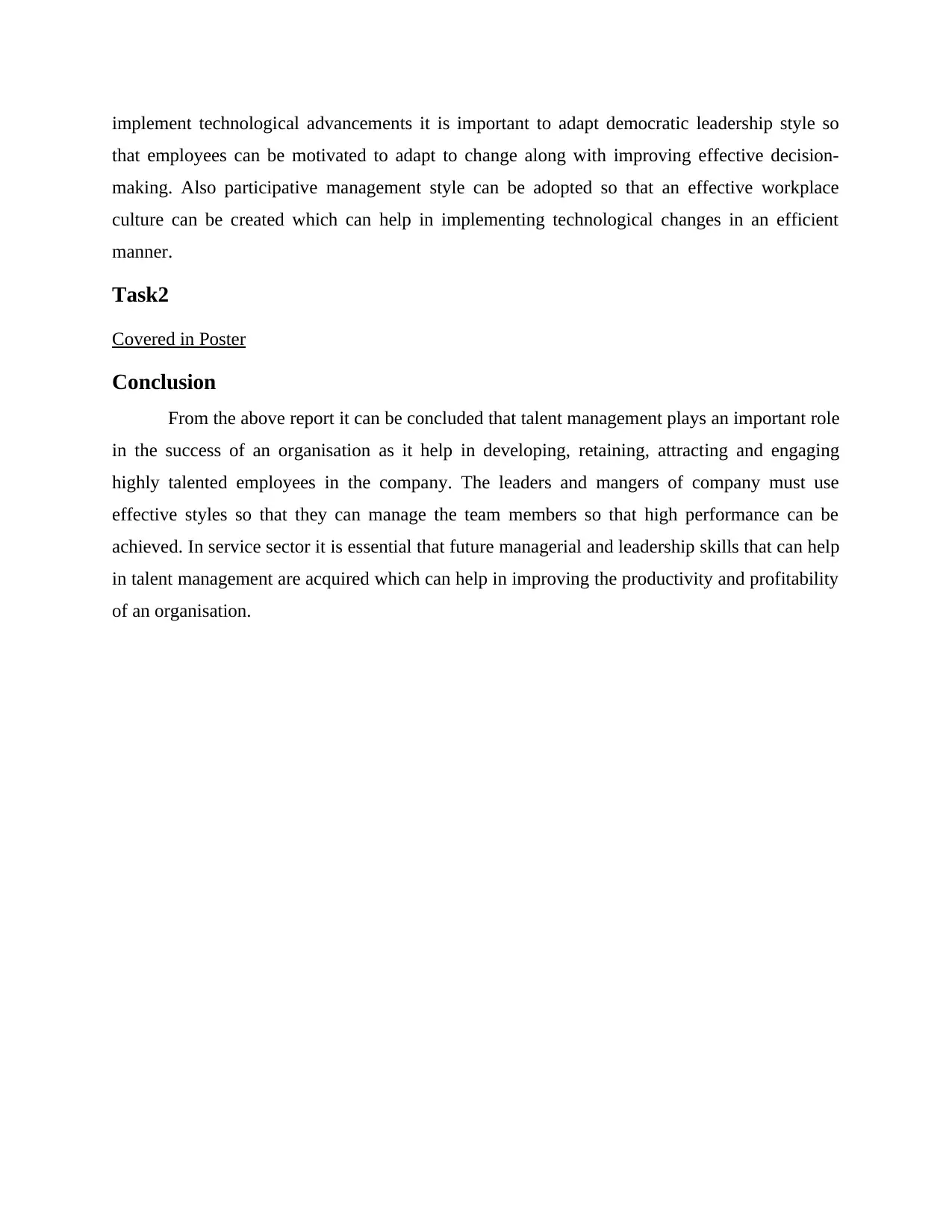
implement technological advancements it is important to adapt democratic leadership style so
that employees can be motivated to adapt to change along with improving effective decision-
making. Also participative management style can be adopted so that an effective workplace
culture can be created which can help in implementing technological changes in an efficient
manner.
Task2
Covered in Poster
Conclusion
From the above report it can be concluded that talent management plays an important role
in the success of an organisation as it help in developing, retaining, attracting and engaging
highly talented employees in the company. The leaders and mangers of company must use
effective styles so that they can manage the team members so that high performance can be
achieved. In service sector it is essential that future managerial and leadership skills that can help
in talent management are acquired which can help in improving the productivity and profitability
of an organisation.
that employees can be motivated to adapt to change along with improving effective decision-
making. Also participative management style can be adopted so that an effective workplace
culture can be created which can help in implementing technological changes in an efficient
manner.
Task2
Covered in Poster
Conclusion
From the above report it can be concluded that talent management plays an important role
in the success of an organisation as it help in developing, retaining, attracting and engaging
highly talented employees in the company. The leaders and mangers of company must use
effective styles so that they can manage the team members so that high performance can be
achieved. In service sector it is essential that future managerial and leadership skills that can help
in talent management are acquired which can help in improving the productivity and profitability
of an organisation.
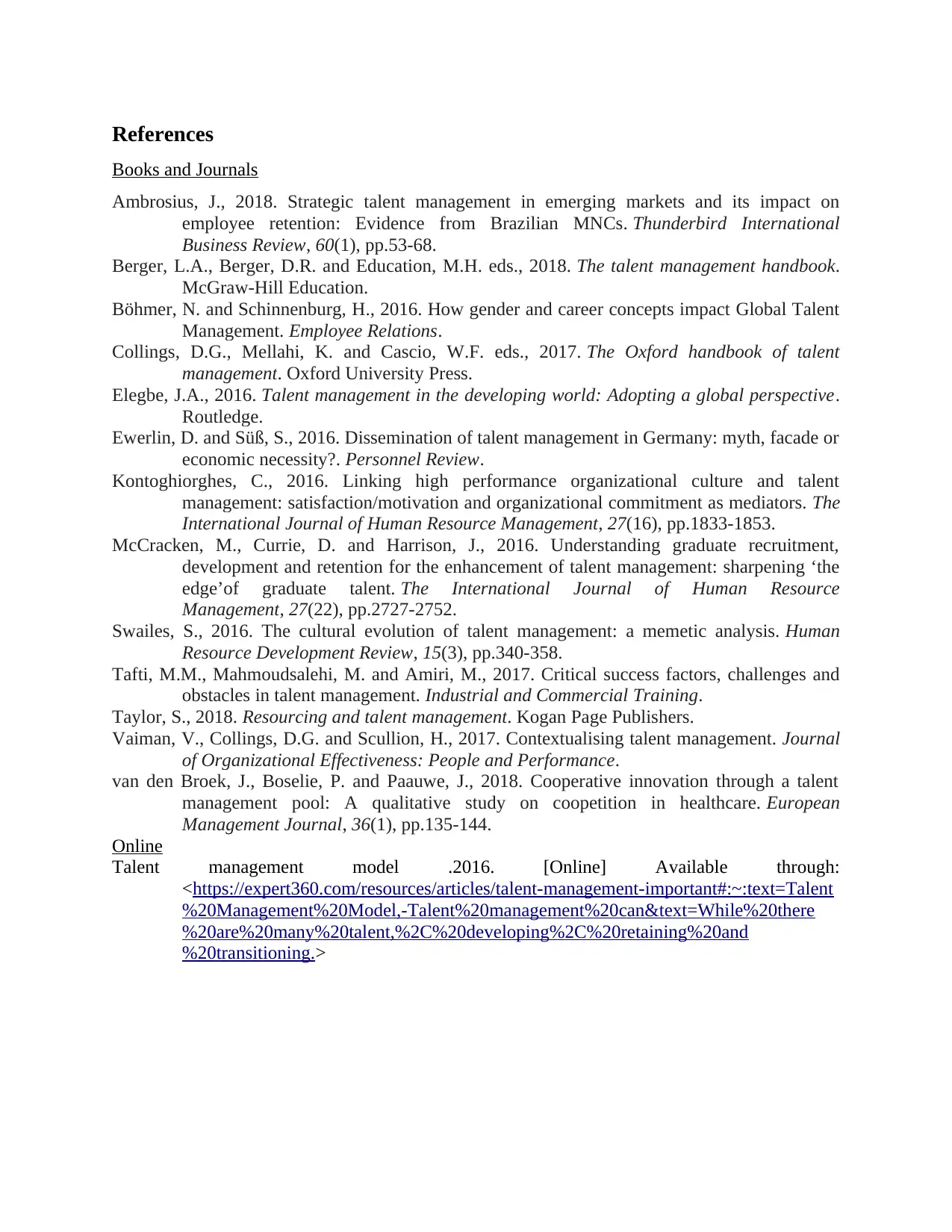
References
Books and Journals
Ambrosius, J., 2018. Strategic talent management in emerging markets and its impact on
employee retention: Evidence from Brazilian MNCs. Thunderbird International
Business Review, 60(1), pp.53-68.
Berger, L.A., Berger, D.R. and Education, M.H. eds., 2018. The talent management handbook.
McGraw-Hill Education.
Böhmer, N. and Schinnenburg, H., 2016. How gender and career concepts impact Global Talent
Management. Employee Relations.
Collings, D.G., Mellahi, K. and Cascio, W.F. eds., 2017. The Oxford handbook of talent
management. Oxford University Press.
Elegbe, J.A., 2016. Talent management in the developing world: Adopting a global perspective.
Routledge.
Ewerlin, D. and Süß, S., 2016. Dissemination of talent management in Germany: myth, facade or
economic necessity?. Personnel Review.
Kontoghiorghes, C., 2016. Linking high performance organizational culture and talent
management: satisfaction/motivation and organizational commitment as mediators. The
International Journal of Human Resource Management, 27(16), pp.1833-1853.
McCracken, M., Currie, D. and Harrison, J., 2016. Understanding graduate recruitment,
development and retention for the enhancement of talent management: sharpening ‘the
edge’of graduate talent. The International Journal of Human Resource
Management, 27(22), pp.2727-2752.
Swailes, S., 2016. The cultural evolution of talent management: a memetic analysis. Human
Resource Development Review, 15(3), pp.340-358.
Tafti, M.M., Mahmoudsalehi, M. and Amiri, M., 2017. Critical success factors, challenges and
obstacles in talent management. Industrial and Commercial Training.
Taylor, S., 2018. Resourcing and talent management. Kogan Page Publishers.
Vaiman, V., Collings, D.G. and Scullion, H., 2017. Contextualising talent management. Journal
of Organizational Effectiveness: People and Performance.
van den Broek, J., Boselie, P. and Paauwe, J., 2018. Cooperative innovation through a talent
management pool: A qualitative study on coopetition in healthcare. European
Management Journal, 36(1), pp.135-144.
Online
Talent management model .2016. [Online] Available through:
<https://expert360.com/resources/articles/talent-management-important#:~:text=Talent
%20Management%20Model,-Talent%20management%20can&text=While%20there
%20are%20many%20talent,%2C%20developing%2C%20retaining%20and
%20transitioning.>
Books and Journals
Ambrosius, J., 2018. Strategic talent management in emerging markets and its impact on
employee retention: Evidence from Brazilian MNCs. Thunderbird International
Business Review, 60(1), pp.53-68.
Berger, L.A., Berger, D.R. and Education, M.H. eds., 2018. The talent management handbook.
McGraw-Hill Education.
Böhmer, N. and Schinnenburg, H., 2016. How gender and career concepts impact Global Talent
Management. Employee Relations.
Collings, D.G., Mellahi, K. and Cascio, W.F. eds., 2017. The Oxford handbook of talent
management. Oxford University Press.
Elegbe, J.A., 2016. Talent management in the developing world: Adopting a global perspective.
Routledge.
Ewerlin, D. and Süß, S., 2016. Dissemination of talent management in Germany: myth, facade or
economic necessity?. Personnel Review.
Kontoghiorghes, C., 2016. Linking high performance organizational culture and talent
management: satisfaction/motivation and organizational commitment as mediators. The
International Journal of Human Resource Management, 27(16), pp.1833-1853.
McCracken, M., Currie, D. and Harrison, J., 2016. Understanding graduate recruitment,
development and retention for the enhancement of talent management: sharpening ‘the
edge’of graduate talent. The International Journal of Human Resource
Management, 27(22), pp.2727-2752.
Swailes, S., 2016. The cultural evolution of talent management: a memetic analysis. Human
Resource Development Review, 15(3), pp.340-358.
Tafti, M.M., Mahmoudsalehi, M. and Amiri, M., 2017. Critical success factors, challenges and
obstacles in talent management. Industrial and Commercial Training.
Taylor, S., 2018. Resourcing and talent management. Kogan Page Publishers.
Vaiman, V., Collings, D.G. and Scullion, H., 2017. Contextualising talent management. Journal
of Organizational Effectiveness: People and Performance.
van den Broek, J., Boselie, P. and Paauwe, J., 2018. Cooperative innovation through a talent
management pool: A qualitative study on coopetition in healthcare. European
Management Journal, 36(1), pp.135-144.
Online
Talent management model .2016. [Online] Available through:
<https://expert360.com/resources/articles/talent-management-important#:~:text=Talent
%20Management%20Model,-Talent%20management%20can&text=While%20there
%20are%20many%20talent,%2C%20developing%2C%20retaining%20and
%20transitioning.>
⊘ This is a preview!⊘
Do you want full access?
Subscribe today to unlock all pages.

Trusted by 1+ million students worldwide
1 out of 12
Related Documents
Your All-in-One AI-Powered Toolkit for Academic Success.
+13062052269
info@desklib.com
Available 24*7 on WhatsApp / Email
![[object Object]](/_next/static/media/star-bottom.7253800d.svg)
Unlock your academic potential
Copyright © 2020–2026 A2Z Services. All Rights Reserved. Developed and managed by ZUCOL.





